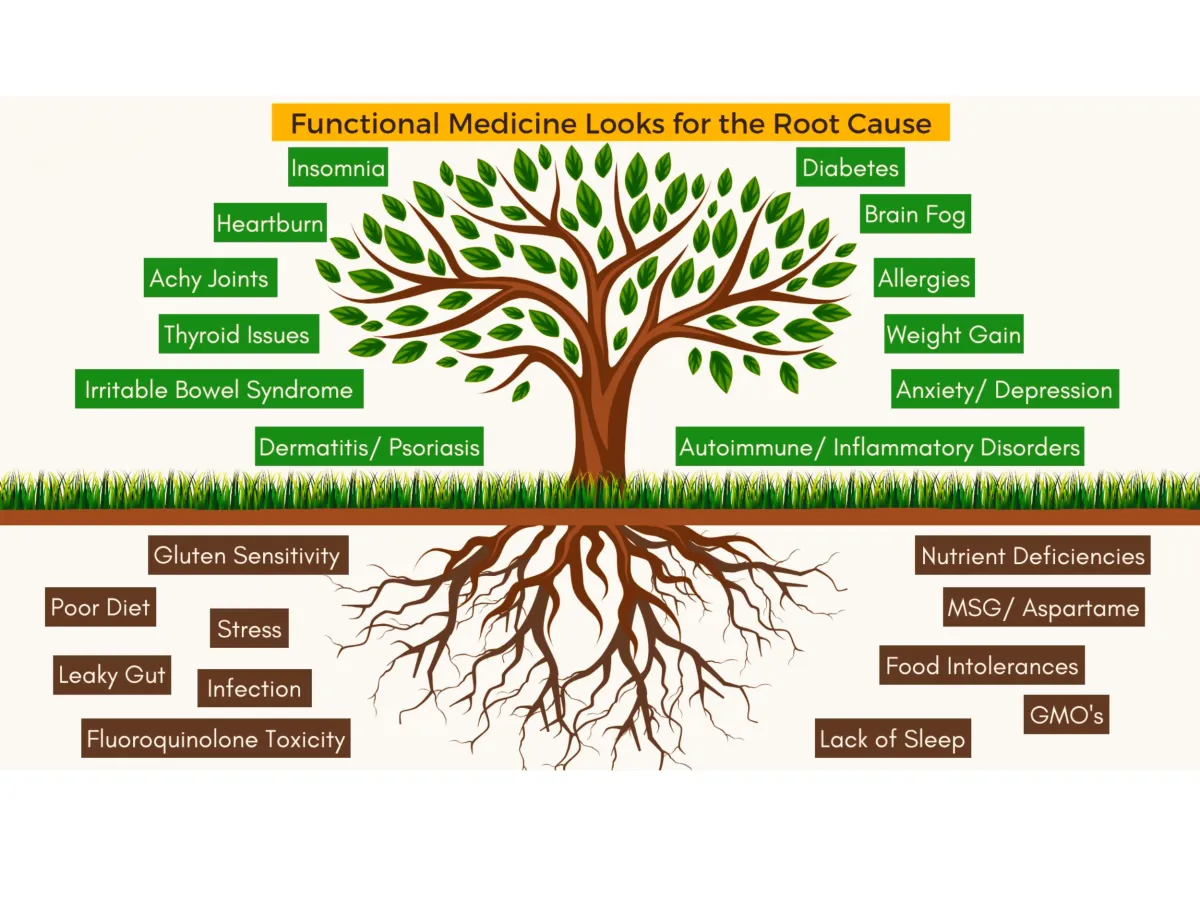Call or Text (248) 844-2665
What is Functional Medicine?

What is Functional Medicine?
Functional medicine, also referred to by some providers as 'the medicine of the future,' is a patient-centered system of healing that distinguishes itself from mainstream (traditional allopathic) medicine. While traditional medicine often focuses on managing symptoms, functional medicine aims to identify and address the root cause of the patient's health problem.
Unlike the approach of prescribing drugs to manage conditions or symptoms, functional medicine seeks to understand why an individual is sick and why specific symptoms or conditions have developed. By asking these fundamental questions, functional medicine practitioners delve into the factors that contribute to or exacerbate chronic diseases.
This patient-centered approach is a fundamental aspect of functional medicine, emphasizing the importance of personalized care and treating individuals as unique entities rather than simply applying generalized treatment protocols. By identifying and addressing the underlying causes of illness, functional medicine aims to provide long-term solutions that promote healing and overall well-being.
How is Functional Medicine different from other forms of alternative medicine?
Functional medicine stands apart from other forms of alternative medicine due to its unique approach. It distinguishes itself in the following ways:
Focus on the cause:
Functional medicine seeks to identify the underlying causes of a disease, rather than solely managing the symptoms. For instance, it aims to eliminate factors that increase inflammation rather than just addressing pain resulting from chronic inflammation.
Patient-centered care:
Functional medicine places the patient at the center, considering their physical, emotional, and psychological state. It involves a comprehensive evaluation process that examines current and past lifestyle and dietary choices, emotional and physical traumas, and the body's reactions to these factors.
Minimize harm:
Functional medicine prioritizes avoiding potential harmful side effects by utilizing natural alternatives whenever possible, instead of relying solely on prescription drugs or surgeries. Treatment plans are personalized for each patient, rather than employing the same drug for all individuals with the same disease or symptoms. The treatment protocol may include nutritional guidelines, lifestyle changes, herbal medicine, and more.
Is it scientific?
The evaluation and treatment methods used in Functional Medicine are based on clinical studies published in peer-reviewed medical journals. The field of Functional medicine was initially developed by Dr. Jeffrey Bland, a former professor of biochemistry at the University of Puget Sound, a previous Director of Nutritional Research at the Linus Pauling Institute of Science and Medicine, and an internationally recognized leader in the nutritional medicine field for over 25 years.
Dr. Bland’s interest and expertise in biochemistry and physiology led to a deeper and more accurate understanding of the factors that shift our body’s function from health to disease. Over time, many scientists and clinicians have been contributing from their experience to the field of Functional Medicine.
How do Functional Medicine providers are trained?
Functional medicine practitioners undergo rigorous and specialized training to acquire the knowledge and skills necessary for practicing this patient-centered approach. Through their training, they develop the ability to identify both external and internal factors that contribute to diseases, enabling them to understand how these factors can be addressed through specific recommendations in areas such as lifestyle, nutrition, herbal medicine, and advanced lab testing.
The training of functional medicine practitioners encompasses a comprehensive understanding of biochemistry, genetics, physiology, and other relevant disciplines. This interdisciplinary knowledge empowers them to approach patient care from a holistic perspective, recognizing the interconnectedness of various bodily systems and their influence on overall health.
A fundamental aspect of functional medicine training is a strong emphasis on evidence-based practices and staying abreast of the latest research in the field. Practitioners are trained to critically analyze scientific studies and integrate the findings into their diagnostic and treatment strategies.
Additionally, they incorporate advanced lab testing into their assessments to gain deeper insights into a patient's physiological and biochemical imbalances. This can involve comprehensive blood panels, hormone testing, gut health analysis, genetic testing, and more. By utilizing advanced lab testing, functional medicine practitioners obtain valuable information that guides the development of personalized treatment plans.
Continuing education plays a vital role in the professional growth of functional medicine practitioners. They actively engage in conferences, seminars, and workshops to stay informed about the latest advancements and developments in the field. This ongoing education enhances their knowledge and expertise, enabling them to provide the most effective and cutting-edge care to their patients.
In conclusion, functional medicine practitioners undergo specialized training that equips them with a diverse skill set and interdisciplinary knowledge. They are proficient in identifying and addressing the underlying factors contributing to diseases. By utilizing evidence-based practices, incorporating advanced lab testing, and pursuing continuous education, functional medicine practitioners are well-prepared to deliver personalized and forward-thinking care to their patients.
Can Functional Medicine replace my primary care provider?
No. The Functional Medicine approach is focused on improving the patient’s health and function, but it does not replace the need for primary care. In some cases, it might be important to manage the patient’s conditions by using prescription or surgery, which a primary care provider or a physician offers.
What happens during the Functional meetings?
During the evaluation process, you will be asked about your previous and current lifestyle, diet, and your external environment (work, home, etc.). You will also be asked about the function of different organs and we might look at your labs.
During our meeting, we will go over your health concerns and the possible factors that might be aggravating your conditions. In other words, we will try to understand ‘what’ is driving your inflammation, oxidative stress, hormonal imbalance, damage to the cells, and conditions. Throughout the process, I will provide you with guidance and education so you can move towards better function and health.
Is it covered by insurance?
Medical insurance was initially designed to cover emergency care, such as surgery after an injury. It was not intended to pay for doctor visits or preventative care. In many cases, providers who work under insurance companies are still functioning in the same way. That is the reason why most primary care visits are done within 7 to 15 minutes.
While primary care services are important, it is almost impossible to complete and full evaluation and understand the external, internal, environmental, and nutritional factors that are aggravating your condition or are keeping you ill in 7 to 15 minutes that insurance companies allow. To spend 1-on-1 time with you, conduct a comprehensive assessment, develop treatment protocols that are personalized to your body, and educate you – we typically need between 30 to 60 minutes.
Unfortunately, many insurance companies do not allow spending extended time with patients and many insurance companies will only cover prescription drugs or surgery. Remember, this is your body and we believe that you should be the one to decide the type of care that you deserve to get to improve your health.
As Jim Rohn once said,
“Take care of your body. It's the only place you have to live.”
We are only taking a limited number of clients for this service. If you are interested, please fill out the form below to add your name on the waiting list.

Oliver Patalinghug
Certified Nutritional & Functional Medicine Health Coach
Licensed Physical Therapist
Text Consent is not a condition of purchase or treatment. Reply STOP to unsubscribe at any time. Msg & data rates may apply. Please view our Privacy policy and Terms of service.
Services
Physical Therapy
Nutrition & Supplement Support
Location
Restore Physical Therapy
705 Barclay Circle, Ste. 135
Rochester Hills, MI 48307
(248) 844-2665
Top-Rated Physical Therapy in Rochester Hills for Active Adults 40+
Helping you stay mobile, avoid painkillers and surgery, and live life fully—without invasive treatments.
Join Our Mailing List Today!

